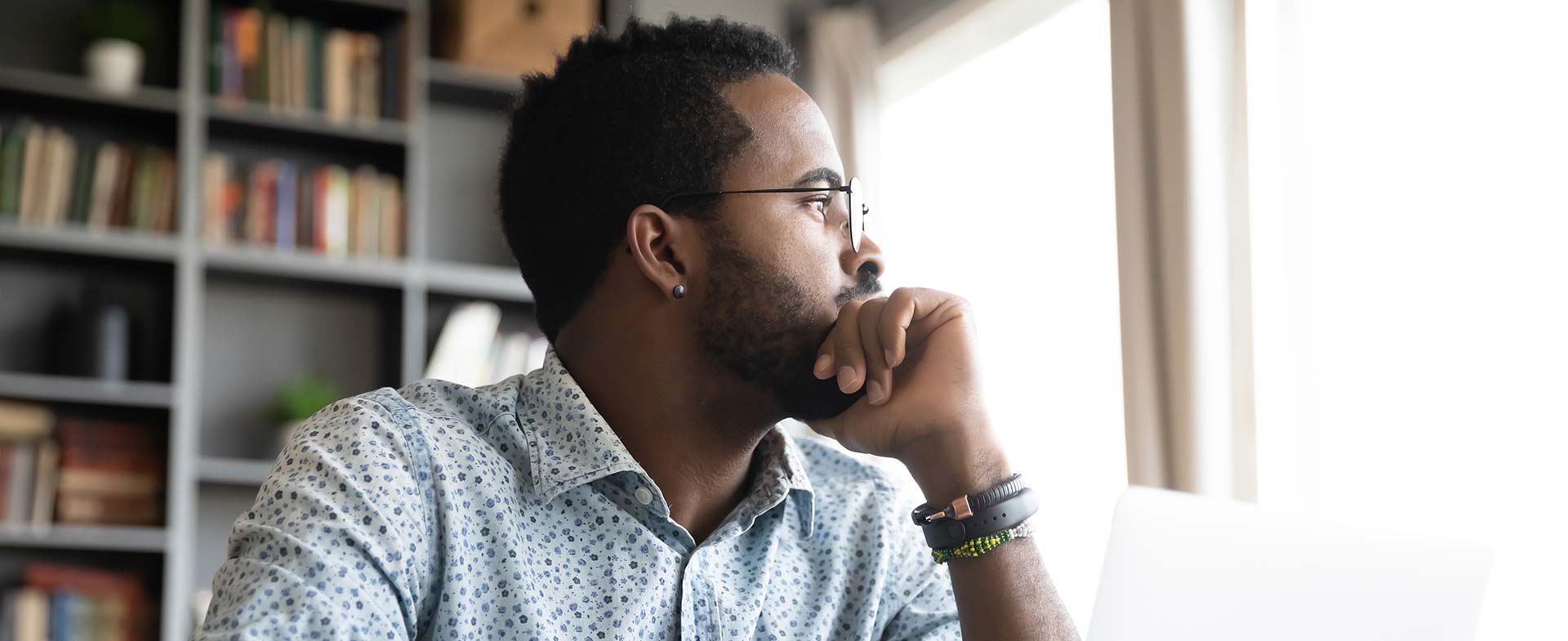With today's tumultuous and uncharted climate, a certain amount of worry and anxiety are normal. While we use these terms interchangeably, they are entirely different animals — and they have different implications for health and well-being.
"If people aren't a little bit worried right now, that's a problem," says Jeffrey Devore, MSW, a behavioral health social worker at Henry Ford Health. "Worry and anxiety fall on a spectrum. They're different states, but they're also interrelated."
Worry Versus Anxiety
Chances are good that you regularly experience some level of worry (or even anxiety). But what do these terms really mean? Both states are marked by a sense of concern, disquiet and possibly stress. But they're not the same.
Here are five key differences between worry and anxiety:
- Worry tends to reside in our minds. | Anxiety affects both body and mind.
"Everyday worries take place in your thoughts, while anxiety often manifests physically in the body," Devore explains. "You might feel faint or lightheaded. Some people even hyperventilate." People who are anxious are also more likely to suffer from digestive problems like nausea, indigestion and irritable bowel syndrome. - Worry is specific. | Anxiety is more generalized.
Whether you're fixating on your odds of contracting the coronavirus or trying to figure out how you'll be able to homeschool three children, worry is distinct and concrete. Anxiety is generally vague. You feel unsettled, but you can't pinpoint what you're really anxious about — and that can make problem-solving difficult. - Worry is grounded in reality. | Anxiety is marked by catastrophic thinking.
There's a logical component to worry. Your brain is trying to make sense of a real and present danger. Worrying when your fears are actionable makes sense. It’s worry that can lead you to take coronavirus precautions, like washing your hands and wearing a mask. Anxiety, on the other hand, overestimates risk. "So if the real risk of a negative outcome is 10%, someone who is anxious may perceive the risk closer to 70%," Devore explains. To make matters worse, people who are suffering from anxiety may underestimate their ability to cope with a negative outcome. - Worry is temporary. | Anxiety is longstanding.
Worry is usually short term. There's a concerning situation (like COVID-19) and you worry about it. Worry prods you to use problem-solving skills to address your concerns. Anxiety is persistent, even when concerns are unrealistic. It often compromises your ability to function. - Worry doesn't impair function. | Anxiety does.
You probably won't be forced to take a sick day due to worries about finances or weight gain. Anxiety, however, seeps into your psyche and can make it difficult to focus and get stuff done.
"Worry and anxiety are not all bad. In fact, they can motivate change," Devore says. "The key is using problem-solving skills to address what you're worried about and reduce the risk of your fears being realized."
What to Do if You're Worrying Excessively
If you worry excessively, or if you're struggling with anxiety, there are a number of things you can do on your own or with the help of a professional to quiet your reactions. A few things you can do at home:
- Turn off the news: Watching the news increases feelings of stress. You can learn the basics and discover what's going on in the world with only two minutes of screen time. "Anything more than that, and you're just watching the same anxiety-provoking news on a loop," Devore says.
- Practice mindfulness: Taking five or 10 minutes a day to tune into yourself and your surroundings can have powerful anxiety-quelling effects. "Many of my clients use apps like Calm or Thrive to help reduce stress and anxiety," Devore says.
- Challenge negative thoughts: If you frequently think, “I can't do this” or, “I'm stuck,” try challenging that thought with two other thoughts: (1) Is it true? And (2) Is it helpful? In most cases, negative thoughts are fueled by an anxious brain. Stopping them with a challenge test can help reset your mind.
- Get comfortable: Since one of the hallmarks of anxiety is avoidance, exposing yourself to what you're anxious about — in small doses — can help you build up tolerance. "The idea is to desensitize yourself to discomfort, to sit in the emotion until you acclimate," Devore says. This type of "exposure treatment" works best when patients also learn relaxation and calming skills.
- Take steps to decompress: It's important to do things each day that help you decompress and manage uncomfortable emotions. Maybe you go fishing on the weekend. Maybe you like to hike or shoot hoops with your kids. No matter what you do, make sure you take time to recharge and regroup.
Worry and anxiety shouldn't be your default zone. If you're struggling with constant fears and concerns, talk to your doctor. "Most primary care providers can address generalized anxiety," Dr. Devore says. Concerned about visiting the doctor? A number of mental health providers offer video visits or other types of virtual care.
To find a doctor or therapist at Henry Ford, visit henryford.com or call 1-800-HENRYFORD (436-7936).
Jeffrey Devore is a clinical social worker who sees patients at Henry Ford Medical Center - Troy.



